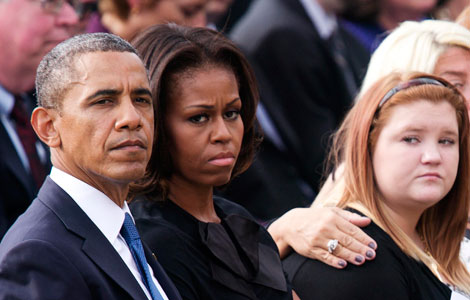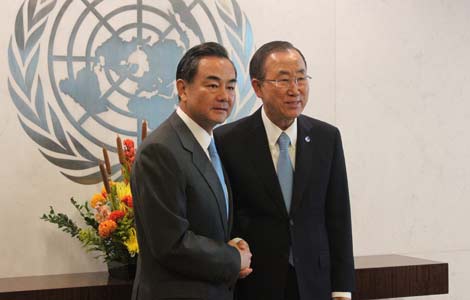Warranty rules to take effect in October
Updated: 2013-09-23 06:54
By Han Tianyang (China Daily)
|
||||||||
Regulations offer remedies for buyers of defective cars
A new regulation on auto warranties will take effect next month that gives Chinese customers unprecedented rights to return a faulty vehicle for a replacement or refund.
In January, the General Administration of Quality Supervision, Inspection and Quarantine issued the 3R regulation - repair, replacement or return - which is also called the "three guarantees" in Chinese. It is set to take effect on Oct 1.
The new rule has been warmly received by not only customers but also dealers and carmakers, as well.
Wang Lei, manager of a BMW dealership in Beijing, said he believes that the 3R regulation will bring mutual benefits to customers, dealers and carmakers.
"Previously, we had no standards to refer to when car owners asked for a replacement or refund, and it's really a difficult situation for the dealers to be sandwiched between the customers and carmakers," Wang said.
"Now it's fine because we have a national regulation, and it won't be our own decision."
A member of staff at an Audi dealership in Beijing who declined to give his name expressed a similar opinion.
"A clear regulation can prevent a lot of disputes," he said.
The showroom he is working in has already put up posters to inform customers about the new policy.
Audi implemented the standards of the regulation one month before it officially takes effect.
Mercedes-Benz began to adopt a similar policy even earlier.
On Aug 30, it announced a new warranty policy that covers its entire product portfolio of brands - Mercedes-Benz, AMG and smart - and it includes corporate as well as private buyers.
|
The warranty regulation plays a vital role in regulating the auto market, analysts say. Lai Xinlin / for China Daily |
It also announced a retroactive policy.
Customers who bought a Mercedes-Benz passenger car after March 1 will be eligible for the 3R policy.
Customer satisfaction has always been a top priority of the company, said Nicholas Speeks, president and CEO of Beijing Mercedes-Benz Sales Service Co Ltd.
"The company's new 3R policy goes above and beyond the legislation's requirements in terms of warranty coverage, roadside assistance service and its courtesy car policy," he said. "Certainly, the 3R promise will increase costs in our after-sales sector."
"However, customer satisfaction and a better brand experience are much more important for us."
Other carmakers that implemented similar policies ahead of the regulations' effective date also include Jaguar Land Rover, Ford, Shanghai GM, Dongfeng Peugeot, FAW Volkswagen, BYD, Chery, Great Wall and BAIC Group.
Challenges
Though companies and dealers are embracing the new rule, analysts pointed out that there are still some challenges with regard to implementation, and authorities must continue to revise regulations while working to enforce them.
"Identifying who is responsible could be a complicated task," said Mei Songlin, vice- president and managing director of JD Power China, Shanghai.
"Sometimes a third-party agency will be required to verify the problem."
Mei also noted that dealers should take the initiative to inform customers about the details of the 3R regulation.
"Active communication could avoid unnecessary complaints and disputes resulting from consumer misunderstandings," he said.
Gai Fang, deputy secretary-general of the China Automotive Maintenance and Repair Trade Association, expressed concern that some carmakers may require customers to receive maintenance and repairs in designated dealerships using only approved parts in order to be covered by the warranty.
In the United States, car owners can get repairs and maintenance at any repair shop that has a government license, and the dealerships must still cover the costs under the warranty, he said.
"It would be better if this can be added to the 3R regulations in the future," he said.
"The regulation needs continual step-by-step improvement."
Though 3R is new to consumers and companies in China, developed countries already have rich experience in dealing with similar laws.
As a country that has a long history of producing and consuming cars, the US in the 1970s enacted the federal Magnuson-Moss Warranty Act, known colloquially as the "lemon law".
It entitles car owners to remedies for defective vehicles, which are commonly referred to as "lemons".
There are also many lemon laws on the state level.
"In the early months and even years of the lemon law, it took people a while to get to understand it and to actually believe it," said Charles Mills, vice- president of global retail experience at JD Power and Associates.
"Now all of the parties are much more experienced in what it means and how it actually follows the process."
Mills noted that he expects a similar development in China."It is part of Chinese market evolution and maturity," he said.
"After-sales service is now a very important profit center for a dealer and a brand.
"The level of quality that is required to avoid lemon law cases will also help those dealerships to make sure their after-sales service system is functioning well and efficiently, and is capable of driving the type of profit they need."
Li Fangfang contributed to the story
hantianyang@chinadaily.com.cn
(China Daily USA 09/23/2013 page14)
Most Viewed
Editor's Picks

|

|

|

|

|

|
Today's Top News
Israeli soldier killed in West Bank shooting
Death toll in Nairobi mall attack rises to 68
Verdict for Bo Xilai: Life in prison
Amber alert across Asia, but not red
China foreign minister at UN
Smithfield shareholder vote Tuesday
China signs 12 deals with Venezuela
Trending news across China
US Weekly

|

|














